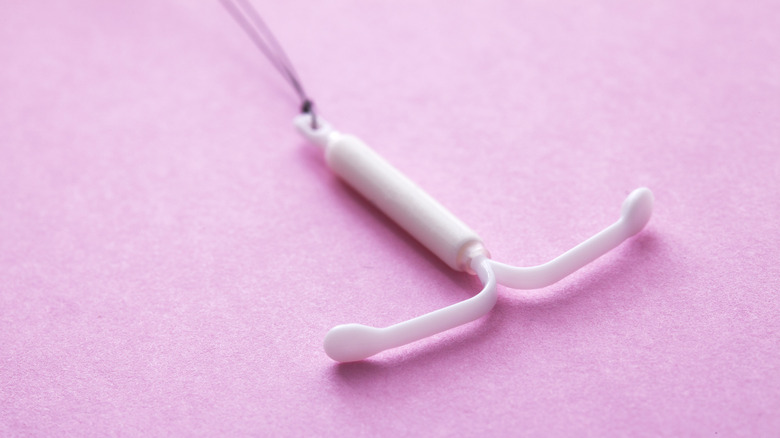Birth Control Mistakes You Never Knew You Were Making
Many women use some form of birth control at some point over the course of their lives. While your doctor probably gave you the low down, there are probably still some mistakes that you're making when you use it. Birth control is pretty important, so you don't want to make mistakes, no matter how big or small.
Although you may suspect there might be something regarding birth control that you're just not doing exactly right, there are also some surprising mistakes that women make that they never would have thought would qualify as a mistake. In fact, some of the birth control mistakes that women make are things that they think are absolutely correct, but really aren't. Regardless, here are the mistakes that anyone taking birth control should know about.
Taking time off
You might have heard friends, family members, or well-meaning strangers tell you that being on birth control for years and years (say, all of your 20s and much of your 30s) and then going off it when you decide you want to try to have a baby is a bad idea and not good for your heath. If you think you need to alternate long stretches of time on a hormonal birth control method with time off, it's just not true.
Dr. Katharine O'Connell White, the director of the Fellowship in Family Planning at Boston University and Boston Medical Center and assistant professor of OB-GYN at the Boston University School of Medicine, told me, "That 'taking a break' thing is like my arch-nemesis because, with the exception of the shot, all methods of birth control are out of your system within 48 hours of stopping it and you go right back to your state of health after that. The shot can take a while, the shot can take up to a year, so that's no joke with regards to how long it lingers, but no method is bad to stay on for a long period of time just because, in fact, the longer you're on birth control, the more you prevent a whole list of things."
This list includes anemia, fibroids, certain types of cancer, endometriosis, and more. Give yourself a break and don't stress so much about it. You just might be doing yourself some good.
Being inconsistent
You probably know that if you take the pill you need to take it every day, but a lot of women are inconsistent with their birth control — and it matters more than you might think.
"They do not know how to use back up protection after missing birth control pills and not taking them consistently as instructed," Dr. Sunny Jun, co-medical director at CCRM San Francisco said. "They are inconsistent. This can lead to unwanted or unexpected pregnancies to occur if not using back up protection such as condoms after missing birth control pills. Also, they should always know that Plan B or emergency contraception is available."
Using breastfeeding as birth control
This is a popular piece of birth control advice on the mom-to-be message boards — and it is, technically, true and possible — however, there are a number of stipulations that a lot of new moms aren't fully aware of.
"You have to be exclusively breastfeeding, which also means no pumping," White shared. "So, exclusively nursing, your periods have not come back, and it still only works for six months. The portion of women that applies to is very small. And intermittent breastfeeding — breast and bottle — which is what a lot of women do, doesn't provide birth control for you."
Given that, as White explained to me, you can get pregnant very quickly after you've given birth, you probably shouldn't rely on breastfeeding as your sole method of birth control, unless you're prepared to potentially get pregnant again.
Not trying an IUD
Chances are, if you're a woman in your 20s or early 30s, you've heard friends or acquaintances share their feelings on IUDs. You may have heard that they're painful to have inserted, that they're the best form of birth control ever, that you can't even tell when they're inserted and you'll never notice, that your IUD made you smell like metal, the list goes on and on.
"Some women are scared of trying a hormonal IUD," Jun said. "This form of contraception is one of the most effective and can also reduce the amount of bleeding as well as cramping. For women, who hate taking pills on a daily basis and are forgetful, IUD is an effective way to prevent unwanted pregnancies."
Not using the right condom
A lot can go wrong if you're not using the right condom, but not everyone even knows what that means.
"Not using the right type of lubricant with a condom can weaken it — you might not have the protection that you think you have," Dr. Ronald D. Blatt, chief surgeon and medical director at the Manhattan Center for Vaginal Surgery, said. "Not choosing the right condom puts you at risk for pregnancy. If a condom is too small it can break. Polyurethane condoms may break more frequently than latex ones. If a condom is too big, it can fall off." Making an appropriate choice will help make your birth control method of choice more effective.
Not keeping your doctor well-informed
You might not think that taking a new supplement, using natural treatment products, or starting a new breakfast routine warrants a phone call to your gynecologist, but they might need to know these things more than you realize.
"A lot of women who are taking these products that they get from a health food store or otherwise, don't think of them as medicine, they think of it as natural therapy for something," White said. "And then also the problem is that we don't know what a lot of these will do to your birth control. St. John's Wort, the fact that we even know that was a stroke of genius by the researchers who thought, 'huh, I'm seeing patients have birth control failure who have on this, let's study it.'"
White also explained that, yes, grapefruit can interfere with the effectiveness of birth control, but it has to be a very large amount. An occasional small glass of grapefruit juice or a cocktail that includes it is no big deal. Talking to your doctor can help avoid a birth control failure and make sure everything is working as it should. You don't have to tell your doctor about absolutely everything, though. "The exception to this is antibiotics," White said. "Those are fine! Those get a huge bad rap, that's not a mistake! Those are fine!"
Using only a period tracking app
Period tracking apps are getting more popular, but if that's the only form of birth control you're using, it might not be enough to effectively do the trick. "Birth control might go wrong if you use a period tracking app," Blatt said. "Many are not as accurate as they should be and/or not user-friendly."
Using that as your sole method of birth control could be a bit of a gamble, which is fine if you're mostly concerned with tracking and don't so much mind if you get pregnant (because you're ready), but not so good if you're actively trying to avoid getting pregnant.
Leaving a gap between methods
Switching from one birth control method to another isn't a bad thing, especially if you think the one you're switching to will be a better option for you than the one you're currently using. That being said, make sure you do not leave any time in between using one method and switching over to another.
"This pill or this ring is causing some kind of problem for you, whether it's giving you headaches or giving you discharge, or the patch keeps falling off, whatever it is that you decide that you've had it with this method. And one of the benefits with these methods is that you get to control when you're on it," White said. "You control when you start and you stop and that's a great thing. The mistake is that you stop it and you don't immediately start something else because the body's march towards ovulation is powerful and if you give it an opening..."
If you're actively trying to avoid pregnancy, that opening could mean trouble. Use a back-up method if you'll end up with a gap between methods.
Using the wrong kind of birth control for you
You don't have to stick with one kind of birth control if it's not working well for your body or your life and some women make the mistake of just dealing with the wrong kind.
"You might find that you are forgetful when it comes to taking the pill every day, or that you are experiencing mood swings from hormonal contraception, or that the IUD is just not for you," Nicole Telfer, scientific researcher for the female health app Clue told me. "There is nothing wrong with experimenting with the different methods of contraception available, until you find a method that suits you. Consult your healthcare provider before you make any changes to your current method and keep track of how each change affects you, until you find one that works best."
Don't make yourself sick or miserable because you think the birth control method you're on is the best one. If it's not the best one for you, it's not the best one.
Not using hormonal birth control because you think it will affect fertility
While some people worry that taking birth control for long stretches in their 20s and early 30s will make it more difficult to get pregnant once you're ready, you shouldn't stay away from hormonal birth control because you think it will affect your fertility.
"The birth control doesn't alter anything, it just covers it up and makes it regular and predictable and all those great things that we love about birth control," White explained. "I've also had patients say, 'Well, if I'm not ovulating for 15 years, does that mean I'll have more eggs when I'm 35?' No, it doesn't mean that, unfortunately, eggs are a use them or lose them kind of a problem, and egg quality goes down over time and it does get harder for a lot of women in their mid to late 30s, but that's not the birth control's fault, that's the fault of biology that doesn't respect a career."
It's understandable that you're worried about these kinds of things if you want to be a mom later, when you're ready, but it's not your history taking birth control that makes things harder, it's just that you're older.
Thinking you don't need birth control because you "can't" get pregnant
How many times have you heard a woman say she can't get pregnant? In some cases, it might be true that they can't or the likelihood is extremely slim. However, in other cases, your doctor probably should have said "shouldn't" not "can't."
"[W]omen who are struggling with chronic disease, [whose] doctors tell them they can't get pregnant... what doctors mean is you shouldn't get pregnant, but what patients hear is 'I can't,'" said White. "A world of difference in how you interpret that word 'can't'. No one's too sick to get pregnant."
If you have a chronic condition and were told you couldn't get pregnant, you might want to talk to your doctor to find out if it's truly that you can't or if it's that you shouldn't, in which case you might want to have a conversation about birth control so that together you can find the one that's right for you.











